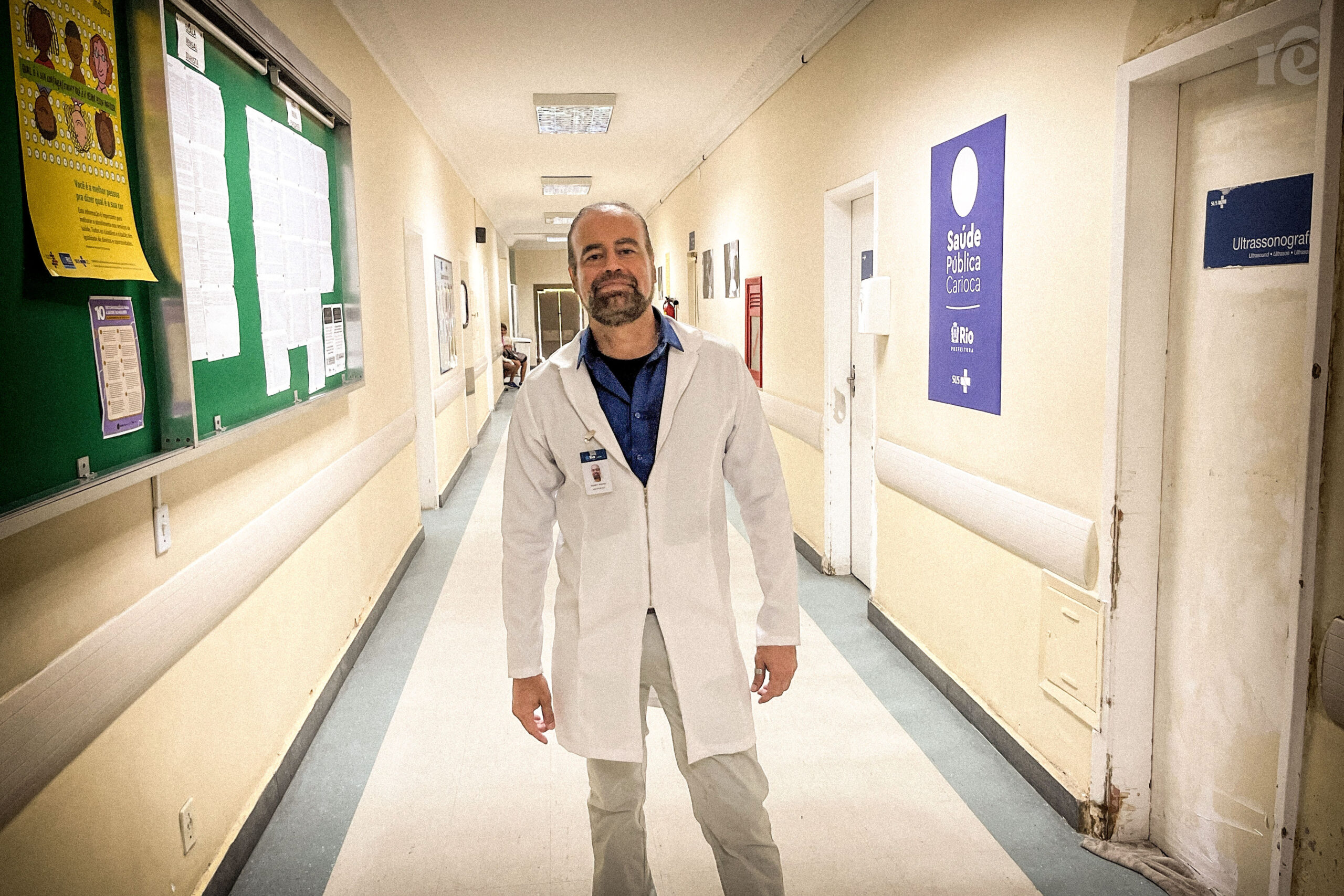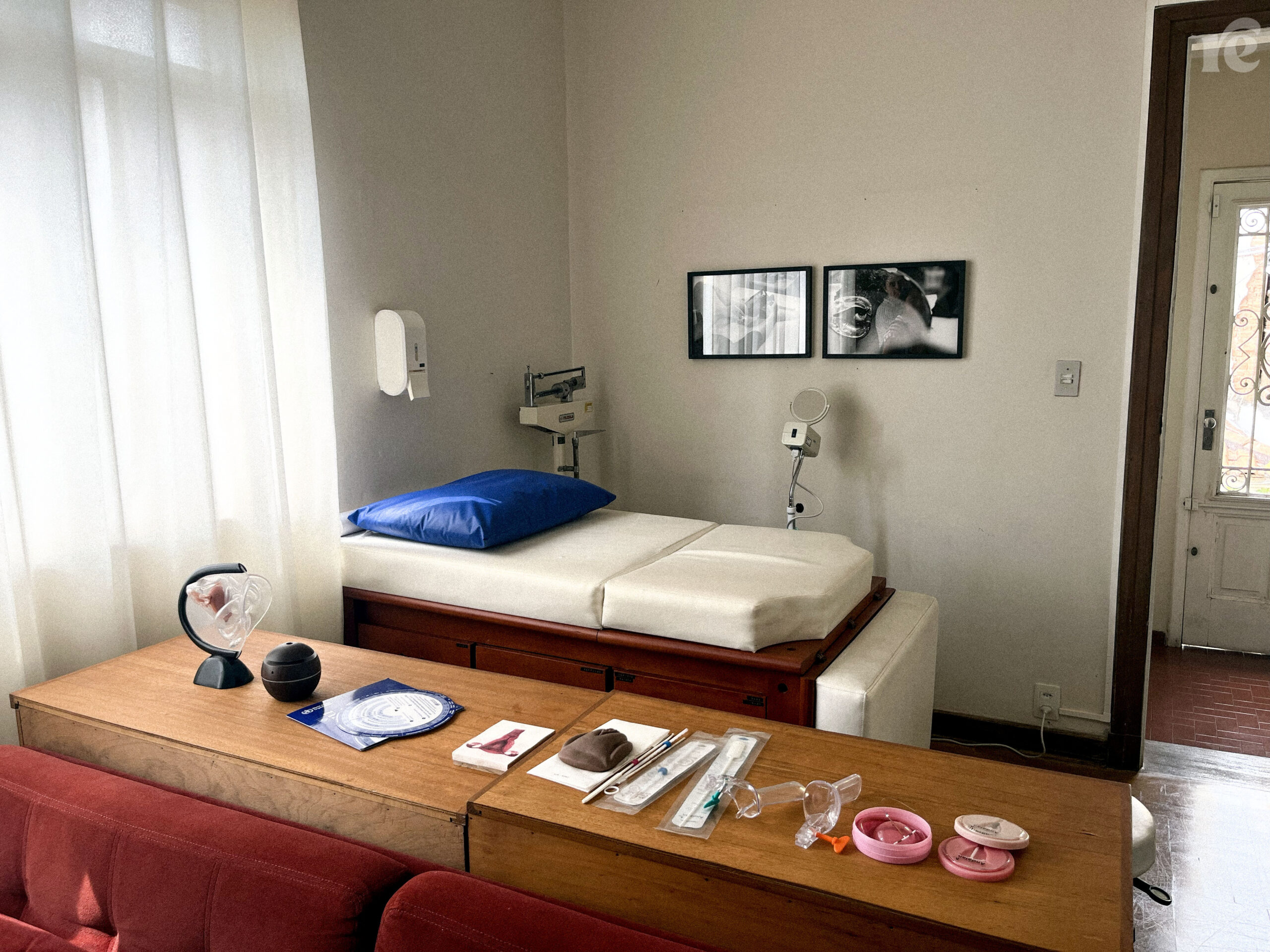Under Brazil’s Abortion Ban, ‘Lack of Information Kills’
Abortion stigma stemming from Brazilian law creates misinformation and delays in legal care, and retraumatizes survivors of sexual violence.

This reporting was supported by the International Women’s Media Foundation’s Reproductive Health, Rights, and Justice in the Americas Initiative. Read part one here.
On Easter Day in 2023, a woman named Tatiana went to buy Easter eggs for her two daughters. It was something her husband used to do, but he had recently died. So she went herself, after a late shift at a hospital on the outskirts of São Paulo, where she works as a cleaner.
As she left the grocery store near her home, a man armed with a gun drove up and grabbed Tatiana. He threw her into his car and raped her, strangling her and leaving bruises all over her body.
“He hurt me a lot,” Tatiana said when I met her in March. The man also told Tatiana that he’d been watching her, suggesting that he might repeat the attack.
Tatiana went to the nearest public health clinic. When she told the nurse there she had been raped, the nurse said she needed to file a police report. But Tatiana was afraid to go to the police. If she reported the crime, she was terrified that her attacker would find out, and that he might kill her. She also lives in a close-knit community and knew word would get out. She feared she would be blamed for the assault.
At the clinic, Tatiana asked about emergency contraception, expressing concerns that she could become pregnant or that the man had exposed her to a sexually transmitted infection. The nurse simply told her she needed to wait at least 15 days and then come back for a pregnancy test.
By the time Tatiana returned to the clinic, she was pregnant.
She spoke with the chief obstetric nurse. “She said, ‘There are so many cases of rape, where women love their children that they have. Think it through,’” Tatiana said. “And I said, ‘Ma’am, how am I going to have the child of someone who I don’t even know? How can I love rape?’”
Tatiana knew Brazilian law allows abortions in the case of rape, but when she asked the nurse about that option, she was again told she’d need a police report to get a legal abortion.
This isn’t true: Brazil’s 1940 penal code deems abortion a crime with two exceptions—cases of rape and cases where an abortion is necessary to save a pregnant person’s life. In 2012, a Supreme Federal Court decision added an exception for cases of fetal anencephaly, a condition where the fetus is missing parts of the brain and skull. Brazilian courts sometimes grant exceptions in other cases where a fetus cannot survive.
And in cases of rape, no evidence is required by law beyond the victim’s statement. But many hospitals “demand a police report,” said Rebeca Mendes, a lawyer and the founder of Projeto Vivas, an organization that helps people access legal abortions in Brazil or travel out of the country when necessary.
This is just one of many abortion myths perpetuated in medical settings across Brazil. The highly restrictive environment creates fear and stigma surrounding abortion, and this in turn produces misinformation and information gaps, leading to a poorer quality of medical care for all pregnant people.
It’s also a cautionary tale for the United States, where many are focused on cementing exceptions to abortion bans—despite widespread evidence from the United States and abroad that such exceptions don’t work.
Survivors under suspicion

For Tatiana, the outlook finally changed when she got in touch with Projeto Vivas. By the time a colleague—who noticed that Tatiana was suffering—referred her to the organization, she was nearly four months pregnant.
Mendes went through her own highly publicized struggle to get an abortion in Brazil, and in the end, had to travel to Colombia for care. Now, she’s dedicated to helping others access abortion. Mendes said that last year, Vivas helped 247 people obtain legal abortions within Brazil and assisted 255 with travel out of the country. The project’s main funding source is Fòs Feminista.
“When you get this project, you feel the tenderness,” Tatiana said. “[Rebeca] held my hand.” Vivas connected Tatiana with a hospital that provided her with compassionate care. “The psychologist told me, ‘Your suffering is over from now on,’” she said.
Tatiana is far from the only sexual violence survivor to be retraumatized by Brazil’s medical system while seeking an abortion.
According to a study by Debora Diniz, an anthropologist, law professor, and founder of the reproductive justice organization Anis Institute of Bioethics, rape is the reason behind 94 percent of legal abortions in Brazil. And in another 2014 paper, Diniz and her colleagues identified a “shared regime of suspicion of the woman’s narrative” across five of the country’s legal abortion facilities.
This suspicion was on full display when I visited Hospital Maternidade Carmela Dutra, on the outskirts of Rio de Janeiro. While the hospital doesn’t require a police report for abortion care, doctors check the story of any woman who says she was raped to make sure the dates match up with the length of her pregnancy, medical director Dr. Sidney Rocha said. They don’t necessarily doubt that the woman was raped, he said, but if they don’t believe that the pregnancy was the result of a rape, they don’t approve the abortion.
Rocha added that when his staff believes a woman is lying, they will even let other hospitals know, in case she tries to go somewhere else. This isn’t the case everywhere: One gynecologist in the Rio de Janeiro public health system, who is remaining anonymous for fear of reprisal, said her definition of sexual violence is more expansive. She encourages women to consider whether violence or coercion of any kind may have led to their pregnancy.
In 2022, nearly 75,000 rapes were reported in Brazil; 88.7 percent of victims were women, and 56.8 percent, like Tatiana, were Black. A staggering 61.4 percent were children ages 13 and younger. The Brazilian Public Security Forum estimates that only 8.5 percent of rapes are reported to authorities, making these figures a dramatic undercount.
Under Brazilian law, sexual contact with a child younger than 14 is considered rape, and a child pregnant at that age should be able to get an abortion without asking a court for permission. However, there have been numerous high-profile cases of young girls being denied abortions in these circumstances.
One of the cases that sticks with the Rio gynecologist is that of a 13-year-old girl who died in her hospital after being admitted with pregnancy complications.
“Lack of information kills,” the gynecologist said.
‘A map of misinformation about abortion’

In 2020, researchers at the Federal University of the State of Rio de Janeiro (UNIRIO) set out to assess health-care access in Brazil during the COVID-19 pandemic. One segment of the team specifically wanted to investigate whether Brazilian public health facilities had continued to provide legal abortion care.
“What was supposed to be a map of hospitals that do and do not perform legal abortions became a map of misinformation about abortion,” the researchers wrote in a summary of their work, which they ultimately collected into a paper titled “Não Posso Passar Essa Informação,” or “I Cannot Provide This Information.”
Brazil’s constitution defines health as a fundamental right, and all citizens are guaranteed care in the country’s public health system. Any hospital in that system that offers obstetric and gynecological services is supposed to provide abortion care. But very few do, largely because of stigma and confusion regarding abortion’s legality among doctors and other hospital staff, and the fact that many health professionals refuse to provide abortion care.
According to a report recently submitted to the United Nations Committee on the Elimination of Discrimination Against Women, in 2019, only 88 out of 1,115 facilities that had the capacity to offer legal abortion in Brazil were actually doing so. Only about a quarter of Brazil’s women of reproductive age live near one of these facilities, and Brazil’s northern region—the most rural and poor part of the country—has the fewest.
“There’s a lack of social awareness of abortion … And I think this is on purpose.”
– Beatriz Galli, senior policy and advocacy consultant at the NGO Ipas
UNIRIO researchers relied on the Mapa Aborto Legal, a public-facing database of hospitals that do and don’t provide legal abortion, created by the nonprofit Article 19. They contacted every hospital on the list. They were met with judgment, a near-total lack of correct information, and in some cases, verbal abuse.
“I can’t tell you, because it’s a crime, right?” said one receptionist. Another called the researcher a “bitch” and hung up. Yet another said, “No, my daughter, this is a hospital, we perform live births.” Many didn’t respond to attempts to contact them at all.
Another alarming finding: The Brazilian states with the highest rates of sexual violence were the least likely to have a facility providing legal abortion services.
The UNIRIO study was updated in 2021, at which time public hospitals gave correct and complete information about legal abortion only 16 percent of the time, said Edna Raquel Hogemann, a professor who leads the Human Rights and Social Transformation Research Group and serves as dean of UNIRIO’s Center for Juridical and Political Sciences.
A mess of barriers

In Brazilian public hospitals, “misinformation is institutionalized,” Hogemann said. Many staff members who might be a patient’s first point of contact, like receptionists and security guards, either personally disapprove of abortion or don’t know that abortion is legal in some circumstances, added Erica Maia Arruda, also a researcher with Hogemann’s group. Combating this stigma and misinformation will require “technical training as well as cultural change,” she said.
“Often, people don’t have information about the fact that they have a legal right to abortion,” added Beatriz Galli, senior policy and advocacy consultant at the NGO Ipas. “There’s a lack of social awareness of abortion … And I think this is on purpose. The Ministry of Health could promote public campaigns and disseminate information, but they just don’t do it.”
And even those who know their rights and make it to a hospital, like Tatiana, face another barrier: doctors and other medical staff who aren’t willing to help. So-called conscientious objection is one of the greatest obstacles to abortion care in Brazil.
At Carmela Dutra, I asked Rocha to estimate how many physicians in his hospital refused to perform abortions. Eighty percent, he said. And as the medical director, if no other physicians are willing to provide a legal abortion, the responsibility falls to him.
The most common reason cited for such objections is religious belief. But several sources called the veracity of that claim into question.
“I think they take advantage of this denial based on religious or private beliefs, but we know that they don’t really want to provide abortion because it’s very stigmatized,” Galli said.
In some cases, she added, they may fear prosecution or harassment. “Everything changed in 2018,” the Rio gynecologist said, referring to the election of far-right former President Jair Bolsonaro. “Before then, it was easier to be a public advocate.”
Still, she ensures her service has at least one doctor on every shift who will provide abortion care. And sometimes, doctors are willing to reevaluate their positions.
“When you welcome the objector, they collaborate,” she said. “They come to understand that each woman has a different story, and then and sometimes the objectors are not such objectors.”
Advocates are also working to support doctors in the hopes of helping them stand up to the pressure.
“We have connections to all the main [legal abortion] services in Brazil,” Diniz said. “We say if you get sued, if you get harassed, we are going to be by your side. And we actually are, because we have several cases of doctors being harassed, and we’re doing their legal defense.”
‘The mindset is to keep the pregnancy’

There is no reliable data on the number of deaths due to unsafe abortion in Brazil. However, the prohibition is believed to be a leading driver of the high pregnancy-related death rate. One recent study found that 5.2 percent of all hospitalizations in women of childbearing age between 2008 and 2018 were related to abortion.
The most recent National Abortion Survey, a project Diniz helms, found that in 2021, nearly 1 in 7 Brazilian women had an abortion by age 40, and that over half of them had to be hospitalized to safely complete the abortion.
The widespread use of misoprostol—a drug originally approved to treat gastric ulcers—for abortion traces back to Brazil in the late 1980s and early 1990s. At the time, it was sold without a prescription and was mostly used by working-class and poor women to end pregnancies, or as most of them thought of it, to restore their menstrual cycles. In response, the Brazilian government enacted new regulations on misoprostol in 1998. The rules are so stringent that misoprostol is difficult to obtain even in some health-care settings.
As a result, illegal misoprostol can be very expensive, and it’s often fake. Still, said the Rio gynecologist, women who have used fake misoprostol—which generally just doesn’t work—are usually better off when they arrive at the hospital than those who have turned to less safe means, like drinking toxic chemicals or injuring themselves in an attempt to end the pregnancy.
And it’s not just unsafe abortions driving pregnancy-related deaths: Complications and deaths are typically associated with “delay in transportation to higher complexity facilities, and delay in the provision of adequate treatment at health-care institutions,” the authors of one 2018 review wrote. Many maternal deaths could be avoided, they said, through more timely care.
I asked Rocha if the abortion ban and high rate of objection among medical providers leads to inadequate training for such complications, or delayed care. He said no, but the Rio gynecologist disagreed. “Legal abortion wasn’t even mentioned when I was a student,” she said.
Maíra Bittencourt, a midwife and director of the feminist health clinic Coletivo Feminista Sexualidade e Saúde, said the problem is also a cultural one within the medical field. The way many health professionals think about the risk to a pregnant person’s life is too narrow, she said.
“The mindset of these professionals is not, ‘Oh you have severe diabetes, or high blood pressure, or cancer … You have the right to end the pregnancy and to go through the treatment,” she said. “The mindset is to keep the pregnancy.” Medical professionals rarely consider mental health in pregnancy, she added, and if a pregnant person dies by suicide, that is not counted as a maternal death.
However, some change could be on the horizon, and least among a new generation of doctors. For instance, now that she has a reputation for being a provider who is more open to providing abortion care, the Rio gynecologist said, like-minded young doctors seek out training with her.
Bittencourt said Coletivo Feminista has also begun to receive requests from medical students for lectures about reproductive and sexual health care, including abortion. (Coletivo does not currently provide abortions due to regulatory barriers, including restrictions on misoprostol.)
All of these barriers—suspicion, lack of access to care, risk of death—disproportionately affect Brazil’s marginalized populations, including Black and Indigenous people and poor people. The wealthy, on the other hand, can afford to travel out of the country or pay for care in private clinics.
“To the privileged classes, abortion is freely accessible,” said Hogemann, the UNIRIO professor.
Is decriminalization on the horizon?

A measure before Brazil’s Supreme Federal Court would decriminalize abortion in the first 12 weeks of pregnancy. But the court’s president, Luís Roberto Barroso—who happens to be the attorney who successfully argued the anencephaly case—said in March that he didn’t think the country was ready for such a reform.
“I think it’s a very important case. But at the current moment, I think the Brazilian society is not totally aware of what’s really at stake when we discuss abortion,” he said in March. “Everyone knows my position … So what I’m doing is trying to have this debate with the Brazilian society and have people understand what is at stake. And before doing that, I’m not even sure if the majority of the court will support this position.”
Barroso has said much the same before. This idea—that public opinion needs to catch up in order to decriminalize abortion—angers many feminists, who believe the court should force the public conversation by voting on decriminalization. But some of the experts I spoke with said they understand Barroso’s position.
“We are far from having as strong and deep a discussion about abortion as we should,” Hogemann said. “As academics, and as members of civil society, we need to take responsibility for that, for having these discussions within our bubble. We need to spread this discussion to those that most need the information.”
In the United States, sexual violence survivors can contact RAINN online or at 800-656-4673 for support. In Brazil, download AzMina’s PenhaS app.
Mariana Della Barba, Maria Martha Bruno, Júlia Das Carneiro, and Roberta Fortuna contributed reporting to this project.

